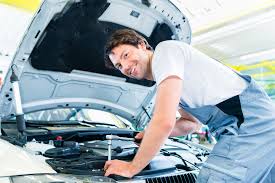How do I not get scammed by mechanics?
Auto mechanics provide a very important and necessary service. A good mechanic will give your car the service it needs at a reasonable price. Unfortunately, some mechanics are less than honest. They rely on the average consumer’s ignorance about many types of car repairs, and attempt to charge you for products and services you don’t need and may not even receive once you’ve paid for them.
Protect your investment and your car. Make sure you know how to keep an eye out for auto repair shop scams. These smart tactics will help you spot fraudulent claims before you’re taken in, so you can get your car out of the shop unscathed and take it on to a mechanic who deserves your patronage.
Reference Your Car’s Maintenance Manual
Your vehicle’s maintenance manual is an invaluable resource when you’re dealing with car mechanics. It has all the essential information you need to understand your car’s basic needs. While your car manual can’t tell you how to fix everything that might go wrong, it will clue you in to some crucial details in regards to standard maintenance and upkeep. There are many common scams that a mechanic might try to pull off that you could catch with a simple look at your maintenance manual.
One of the more common scams that you’ll run into at the shop is the dirty air filter claim. Shady mechanics love to tell customers that their air filters are dirty, when this is rarely true. There are even reports of shops keeping a dirty filter on hand to show off to customers for effect.
What car owners don’t typically realize is that this isn’t even the filter from their car. Your maintenance manual will tell you how often you should have the air filter changed – typically every 15,000 to 20,000 miles. If you’re well under this milestone, don’t trust a mechanic who claims you need the change.
Mechanics may also try to up-sell you on your oil change. They’ll claim that you need a special synthetic or premium oil that’s more expensive than what you came in for. This is another instance where you can turn to your vehicle’s manual to get the real scoop on what you need, so you’re not investing in unnecessary upgrades.

Decode Mechanic Speak
If you’re not familiar with cars and car repairs, a mechanic’s explanation of what’s wrong with your vehicle can sound like a foreign language. If you don’t understand what your mechanic is telling you, ask for a written estimate of the work, take notes on everything he’s telling you, and let him know that you’ll come back or call back later. Don’t agree to any work that you don’t understand.
The internet is a valuable resource for learning more about different car problems. Get to know the parts of your vehicle that purportedly need repairs. Find out what the symptoms are for the quoted problem. If you see anything that looks suspicious or doesn’t line up, you may want to decline service at that particular shop.
Ask to See the Issues
Ask your mechanic to show you exactly what’s wrong with the vehicle. Some mechanics aren’t accustomed to this approach, and may balk at the suggestion. They’ll seem particularly uncomfortable if they’re making claims that are untrue. This is where your previous research comes in handy. If you’re not well-acquainted with the parts in question, take a look online before you request your tour of your car’s problems. You should find some pictures of what different issues look like so you can recognize them when you’re shown.
If your mechanic refuses to show you what’s wrong with the car, you should take your business elsewhere. You should also be very skeptical if the problem doesn’t look as it should. You may want to take a photo to show to a more car-savvy friend if you’re still not sure what you’re looking at. A reliable mechanic will be happy to explain the problem in more detail and demonstrate what’s going on before you commit to the repair.

Be Wary of Unrelated Issues
You head in to your local shop for an oil change because you found an unbeatable deal in the paper. You’re expecting to walk out with a tiny bill for a basic service, but before you can pick up your car, you’re informed of several other issues you never suspected. This is a common tactic that unscrupulous mechanics will use to try to get more money out of customers. You’re lured in by the too-good-to-be-true deal because it really is too good.
Don’t agree to any repair for an issue that your car showed no signs of, particularly when you took the car in for a special or coupon offer. Get only the service you scheduled. You can always bring your car back later if you determine that it has a genuine problem.
Don’t Pay for Unauthorized Fixes
A good mechanic will always give you a quote and get your permission before fixing anything. If your car repair shop goes ahead and fixes parts that you didn’t authorize them to handle, don’t pay for the service. You can contact the police if the shop refuses to return your car to you, and report the business for fraud if they continue to try to collect on the bill.
Too many drivers simply pay the bill for this kind of service, which encourages the mechanics to perpetuate these unfair practices. Even if you believe that your car does need the service, and you would have elected to go ahead with it under ordinary circumstances, you should withhold your payment in the case of unauthorized repairs.

Get Another Opinion
If anything seems shady about your shop at all, don’t hesitate to take your vehicle to another shop for a second opinion. Don’t tell the second mechanic what the first one said. This could provide too much leading information and tempt the second mechanic to throw out a similar diagnosis if it will give them a high profit.
If the two come back with drastically different diagnoses, you’ll know that one of them isn’t giving you an accurate report. Never let a shop pressure you into leaving your car there if you want to take it somewhere else. This is your right. Shop around your area until you find a service that you’re comfortable with.
Compare Prices
Any time a mechanic tells you that you need an extensive and pricy repair, you should call around before you commit to the job. Ask a few other shops in the area what they’ll charge for the same service. Gather as much information as you can from the original mechanic so you’re equipped to get an accurate price quote from someone else.
Shop around and take your vehicle to the shop that offers you the best deal for the service. Make sure you have a written quote for the price before you commit to the service, so you’re sure you can get the deal you were originally offered.
Go to Well-Recommended Shops
Before you take your vehicle to a repair shop, ask around for recommendations. It’s difficult to choose a new shop at random, and it’s this tactic that often leads to trouble. Talk to friends and family. Consult online review sites for local car services. Go to a reputable shop that you’ve heard good things about.
Don’t trust reviews posted on the mechanic’s own site. These are too easy to fake and are often fraudulent, particularly among shops that are willing to scam you in other ways anyway. As you’re perusing others’ reviews, however, you should keep in mind that it’s unlikely any shop will have completely positive reports. People are more likely to write a negative review because they’re upset, and will often neglect to report their positive experiences.
Don’t Waive the Deductible
There’s one fraudulent scam that can seem very tempting to the customer, and in fact seems to offer upfront benefits. This is the waived deductible scam. The mechanic will offer to waive the insurance deductible for your repair, bill the insurance company for more than what the service cost, and pass the savings on to you. For example, he might suggest installing a used part instead of a new one, then writing a receipt for a new part that you can submit to your insurance company.
No matter how good this offer sounds, you should always decline. This is an illegal act known as insurance fraud. If you’re found out, you could be subject to criminal charges. Don’t put yourself and your family at risk just for the sake of a small discount. You should probably take your vehicle elsewhere as well, since this is a good sign of a mechanic who is up to no good.
